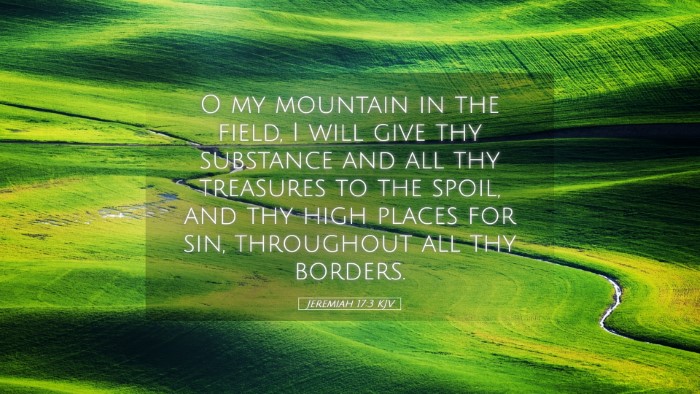Commentary on Jeremiah 17:3
In this verse, God articulates significant judgments against Judah's idolatry and the hollow reliance upon earthly resources rather than divine strength. This commentary synthesizes insights from various public domain sources, including Matthew Henry, Albert Barnes, and Adam Clarke, to provide a coherent study of Jeremiah 17:3.
Textual Context
Jeremiah 17:3 states: "O my mountain in the field, I will give thy substance and all thy treasures to the spoil, and thy high places for sin throughout all thy borders." This proclamation occurs within a larger discourse describing the consequences of Judah’s infidelity to God. This foreshadowing of devastation serves as a warning but also as a divine assertion of sovereignty over Judah's fate.
Thematic Insights
-
Judgment on Idolatry
Matthew Henry emphasizes that Judah's calling of God’s attention to "my mountain" indicates a misplaced reliance on physical strength and security rather than faith in God. This phrase symbolizes confidence in their spiritual high places—idolatrous practices seen as high grounds, yet ultimately leading to ruin.
-
Divine Sovereignty
Albert Barnes explains that the "substance" and "treasures" signify the wealth and prosperity that God would allow to be taken from them. This reflects God's control over the nation's fate; their treasures are not beyond His reach nor beyond His will to remove them as judgment against their sins.
-
The High Places
Adam Clarke furthers this thought, asserting that the high places dedicated to worship other than God would be devastated. The emphasis on "sin throughout all thy borders" indicates a pervasive and systemic failure in the land to uphold covenantal faithfulness and purity.
Symbolism and Metaphors
This verse employs rich symbolism that carries significant theological weight. The "mountain" serves as a metaphor for stability and identity, representing a place where the people once felt secure. The high places, which were specific sites of worship, reveal the duality of human nature: the inclination to worship yet choosing to shift that worship away from the one true God.
Lessons for Ministry
The implications of this verse are profound for pastors and theologians:
- Understanding Covenant Faithfulness: The evident consequences of unfaithfulness highlight the importance of covenant relationships with God. This should challenge leaders to evaluate the fidelity of their communities to God's commandments.
- Worship and Idolatry: The narrative serves as a crucial reminder to analyze modern forms of idolatry within the church. Are congregations relying on wealth, influence, or cultural relevance rather than divine authority and presence?
- Trust in Divine Provision: Encouraging trust in God’s provision is essential. Just as Judah's reliance on their physical resources led to neglect of spiritual health, contemporary believers must guard against similar pitfalls.
- Call to Repentance: Recognizing the futility of worldly securities should lead to genuine repentance and a return to wholehearted devotion to God.
Theological Implications
Jeremiah 17:3 lends itself to important theological discussions regarding divine judgment, human sinfulness, and the nature of true worship. As contemporary scholars engage with this text, they are invited to explore questions such as:
- How does God's judgment manifest in today's world?
- What are the 'high places' of idolatry prevalent in modern Christian contexts?
- In what ways can the church recapture a theology of dependence upon God amidst societal pressures and distractions?
Concluding Reflections
The weight of Jeremiah 17:3 cannot be understated, as it calls God's people to a sincere assessment of their spiritual priorities and practices. As we reflect on Jeremiah’s words, may we seek to root out any high places in our lives and ministries, reestablishing God as the ultimate source of our security and identity.


